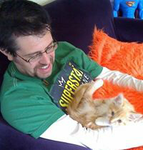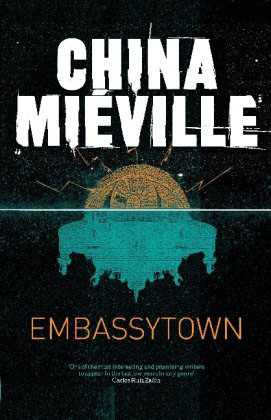Why you can trust GamesRadar+
Top fantasist moves into SF, in uncompromising style
Published: 28 April
490 pages * £16.99
Author: China Miéville
Publisher: Tor
It is, of course, tempting to impose order after the event, to find symmetry where possibly none exists. Nevertheless, the appearance of China Miéville’s eighth novel feels distinctly like the end of a phase in his career, what we might call the difficult-second-tranche-of-books stage of his writing life. It was also, perhaps not uncoincidentally, the beginning to this stage.
To understand what we mean, you need to travel back to 2004. With the publication of Iron Council , Miéville had reached the end of the Bas-La sequence (or at least, he’s yet to return to the world with any full-length offerings). Throw in the drum’n’ bass-suffused King Rat , his debut, and you had a quartet of novels that acted as a fine calling card. What next?
In print chronology (leaving aside the short story collection Looking For Jake ), the answer was 2007’s Young Adult offering Un Lun Dun . Only with The City & The City , another two years on, did Miéville the grown-up writer appear truly to regain his momentum. All of this becomes much easier to understand, though, when you learn that Embassytown was written after Iron Council and long before the crowd-pleasing Kraken .
While the novel now being published is in many respects Embassytown 2.0 , in that it’s been reworked in the years since, you can understand why publishers Tor might initially have balked (as hearsay suggests they did). Hoping for another Perdido Street Station , a rambunctious, sprawling, gothic-tinged urban fantasy, they got a science fiction novel about linguistics.
Yet step back for a moment and you can understand why Miéville wanted, even needed, to try something new. Would we care so much about a new Miéville novel, if he’d spent the last few years turning out Bas-Lag clag ? Quite. With the benefit of hindsight, Miéville’s instincts were true.
As to whether they were quite as true when it came to Embassytown 1.0 , we may never know, but the 2.0 version is, well… let’s start with difficult, infuriating and downright mind-boggling. That, at least, may be your initial reaction to Arieka, a planet where it’s physiologically impossible for single humans to speak with the inhabitants, the enigmatic Hosts, a people who cannot lie. All communication has to be through twinned Ambassadors, whose paired voices combine to form “Language”. Since the Hosts cannot lie, that makes metaphor tricky – if they need to find a simile for something, they have to get someone to act it out, literally becoming part of language. Even though Miéville gives us an insider narrator in Avice, raised in Embassytown but universe-wise after travelling on the immer, a realm of time and space that links planets, this is exotic territory.
But get past the sensation of suddenly being somewhere so utterly alien and trust Embassytown ’s internal logic, and gradually the novel pulls you in. It’s worth the wait, both because Embassytown is daring and exhilarating once you catch its meter, and because no other novel this year will offer up both a zombie apocalypse keyed off by a new kind of Ambassador and a crucial plot twist involving semiotics.
Sure, City & The City is a leaner, better-crafted novel, but that doesn’t make Embassytown any less a thing of ragged glory. And if it does mark the end of the second phase of his career, it’s a testament to Miéville that, despite setbacks, he appears still to be moving forward on his own terms. Jonathan Wright

Dave is a TV and film journalist who specializes in the science fiction and fantasy genres. He's written books about film posters and post-apocalypses, alongside writing for SFX Magazine for many years.



